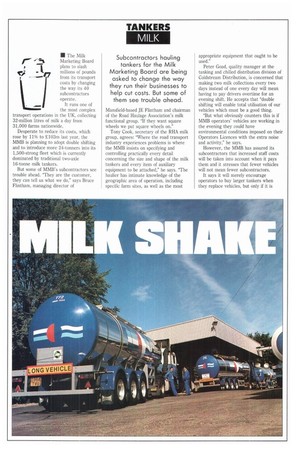TANKERS MILK
Page 36

If you've noticed an error in this article please click here to report it so we can fix it.
Subcontractors hauling tankers for the Milk Marketing Board are being asked to change the way they run their businesses to help cut costs. But some of them see trouble ahead.
• The Milk Marketing Board plans to slash millions of pounds from its transport costs by changing the way its 40 subcontractors operate.
It runs one of the most complex transport operations in the UK, collecting 32-million litres of milk a day from 31,000 farms nationwide.
Desperate to reduce its costs, which rose by 11% to £103m last year, the MMB is planning to adopt double shifting and to introduce more 24-tonners into its 1,500-strong fleet which is currently dominated by traditional two-axle 16-tonne milk tankers.
But some of MMB's subcontractors see trouble ahead. "They are the customer, they can tell us what we do," says Bruce Flintham, managing director of Mansfield-based JE Flintham and chairman of the Road Haulage Association's milk functional group. "If they want square wheels we put square wheels on."
Tony Cook, secretary of the RHA milk group, agrees: "Where the road transport industry experiences problems is where the MMB insists on specifying and controlling practically every detail concerning the size and shape of the milk tankers and every item of auxiliary equipment to be attached," he says. "The haulier has intimate knowledge of the geographic area of operation, including specific farm sites, as well as the most appropriate equipment that ought to be used."
Peter Goad, quality manager at the tanking and chilled distribution division of Coldstream Distribution, is concerned that making two milk collections every two days instead of one every day will mean having to pay drivers overtime for an evening shift. He accepts that 'double shifting will enable total utilisation of our vehicles which must be a good thing.
"But what obviously counters this is if MMB operators' vehicles are working in the evening they could have environmental conditions imposed on their Operators Licences with the extra noise and activity," he says.
However, the MMB has assured its subcontractors that increased staff costs will be taken into account when it pays them and it stresses that fewer vehicles will not mean fewer subcontractors.
It says it will merely encourage operators to buy larger tankers when they replace vehicles, but only if it is
























































































